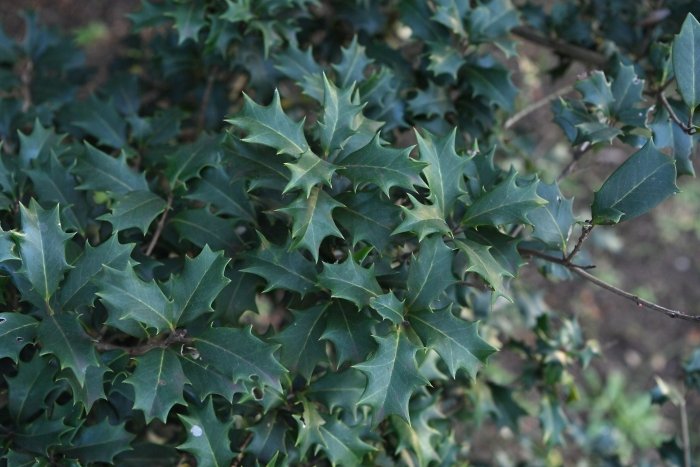Holly Osmanthus
(Osmanthus heterophyllus)
Holly Osmanthus (Osmanthus heterophyllus)
/
/

小石川人晃
CC BY-SA 4.0
Image By:
小石川人晃
Recorded By:
Copyright:
CC BY-SA 4.0
Copyright Notice:
Photo by: 小石川人晃 | License Type: CC BY-SA 4.0 | License URL: https://creativecommons.org/licenses/by-sa/4.0 | Uploader: 小石川人晃 | Publisher: Wikimedia Commons | Title: Osmanthus_heterophyllus_in_Ibaraki,_Japan_02.jpg | Notes: User created page with UploadWizard |




























































Estimated Native Range
Summary
Osmanthus heterophyllus, commonly known as Holly Osmanthus or False Holly, is an evergreen shrub or small tree native to the understory of forests in Japan, Korea, and Taiwan, where it thrives in the dappled light of woodland areas and along forest margins. It typically grows to 2–8 m (7–26 ft) tall, with a slow to moderate growth rate. The bark is brown to grey or blackish, cracking into small plates on older specimens. Its leaves resemble those of holly, with spiny margins on young plants and smoother margins on mature plants. The highly fragrant, white flowers bloom in the autumn and are small but notable due to their sweet scent. The fruit is a dark purple drupe, ripening the summer following flowering.
Holly Osmanthus is valued for its dense, spiny foliage which makes it an excellent choice for hedges and privacy screens. It is also appreciated for its fragrant flowers and the textural contrast its leaves provide in the landscape. It can be grown in urban environments, borders, and as a specimen plant. This species prefers full sun to part shade, medium water, and well-drained soils. It is adaptable to different soil types but does best in slightly acidic to neutral pH soils. Popular cultivars include ’Goshiki’, with variegated leaves, and ’Purpureus’, known for purple new growth. While generally pest-resistant, scale insects and leaf spot can occasionally be problematic. It is not known for aggressive roots or significant disease issues.CC BY-SA 4.0
Holly Osmanthus is valued for its dense, spiny foliage which makes it an excellent choice for hedges and privacy screens. It is also appreciated for its fragrant flowers and the textural contrast its leaves provide in the landscape. It can be grown in urban environments, borders, and as a specimen plant. This species prefers full sun to part shade, medium water, and well-drained soils. It is adaptable to different soil types but does best in slightly acidic to neutral pH soils. Popular cultivars include ’Goshiki’, with variegated leaves, and ’Purpureus’, known for purple new growth. While generally pest-resistant, scale insects and leaf spot can occasionally be problematic. It is not known for aggressive roots or significant disease issues.CC BY-SA 4.0
Plant Description
- Plant Type: Shrub
- Height: 8-10 feet
- Width: 7-9 feet
- Growth Rate: Moderate
- Flower Color: White
- Flowering Season: Fall
- Leaf Retention: Evergreen
Growth Requirements
- Sun: Full Sun, Part Shade
- Water: Medium
- Drainage: Medium
Common Uses
Bank Stabilization, Bee Garden, Bird Garden, Border Plant, Deer Resistant, Drought Tolerant, Fragrant, Hedges, Hummingbird Garden, Low Maintenance, Rabbit Resistant, Salt Tolerant, Street Planting
Natural Habitat
Understory of forests and forest margins in Japan, Korea, and Taiwan
Other Names
Common Names: Holly Olive , False Holly , 구골나무 , 異葉木犀
Scientific Names: Osmanthus heterophyllus , Osmanthus rotundifolius , Osmanthus purpureus , Osmanthus heterophyllus var. bibracteatus , Osmanthus aquifolium , Osmanthus ilicifolius , Osmanthus acutus , Olea aquifolium , Olea ilicifolia , Osmanthus heterophyllus f. subangustatus
GBIF Accepted Name: Osmanthus heterophyllus (G.Don) P.S.Green